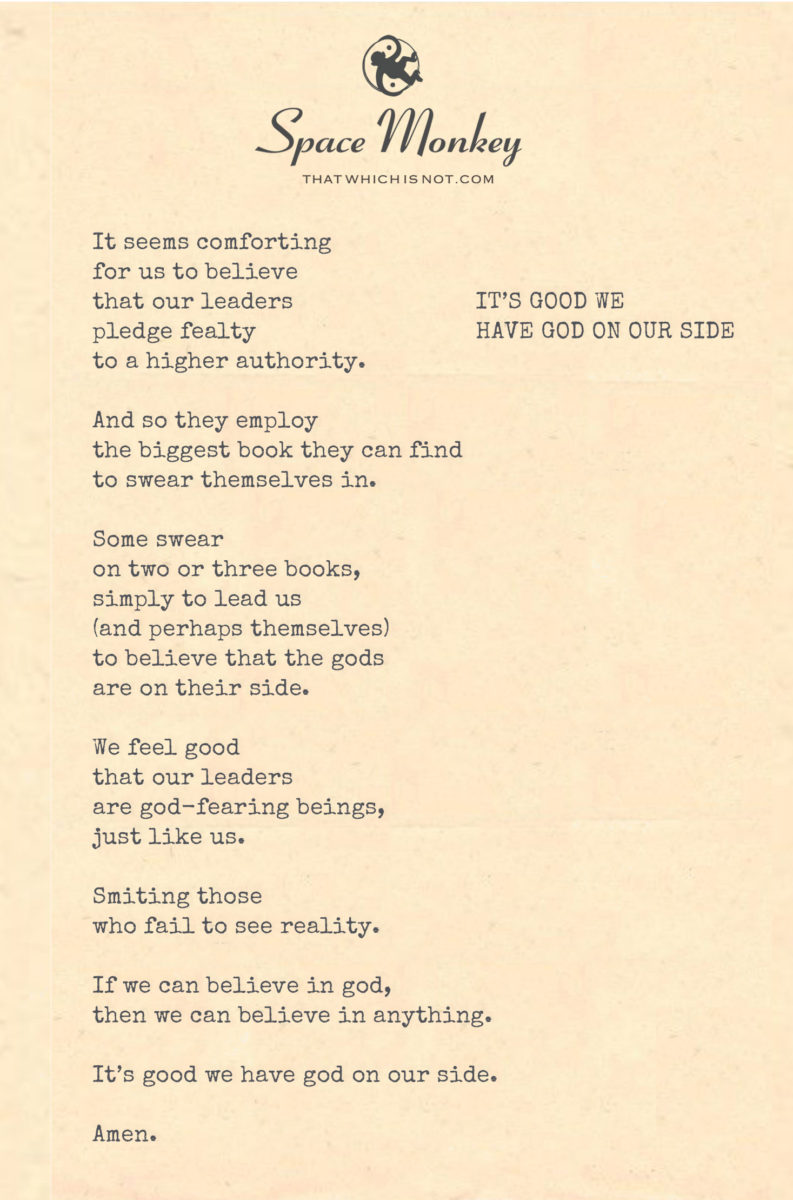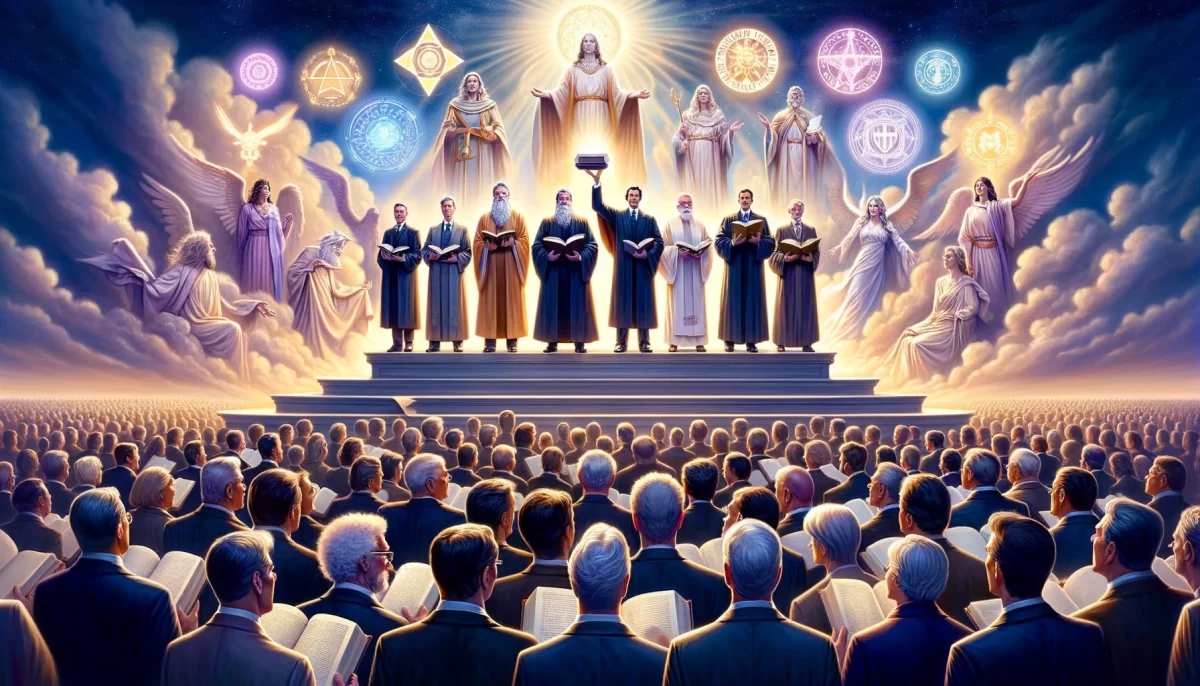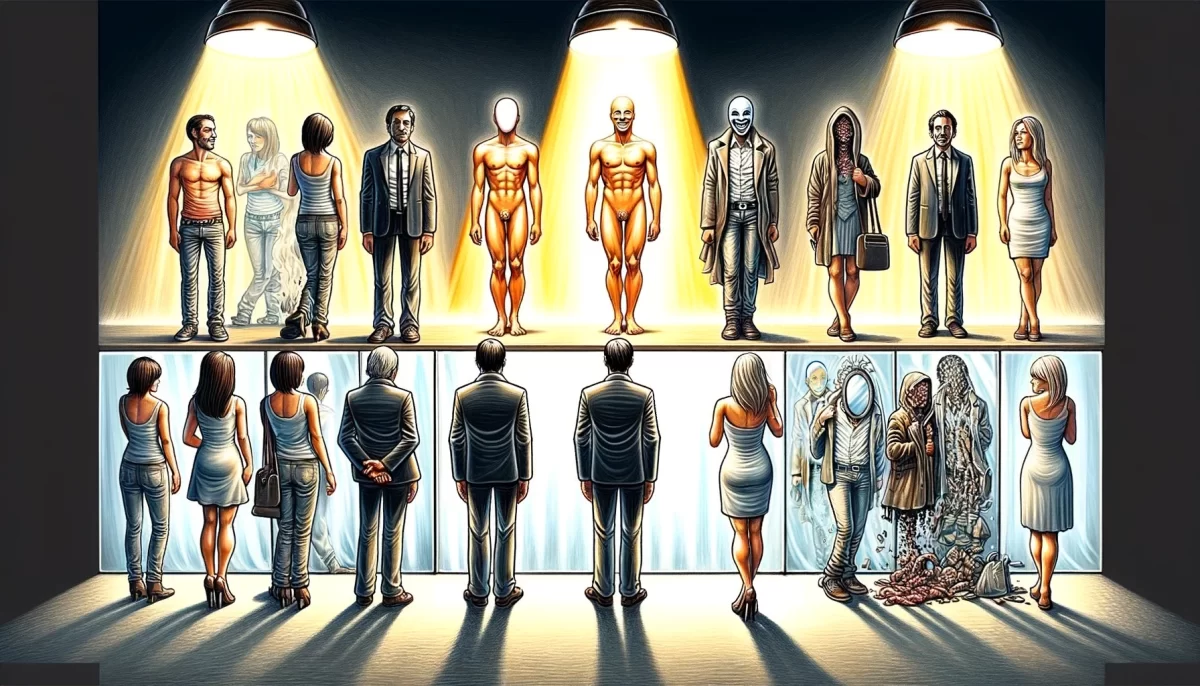
It seems comforting
for us to believe
that our leaders
pledge fealty
to a higher authority.
And so they employ
the biggest book they can find
to swear themselves in.
Some swear
on two or three books,
simply to lead us
(and perhaps themselves)
to believe that the gods
are on their side.
We feel good
that our leaders
are god-fearing beings,
just like us.
Smiting those
who fail to see reality.
If we can believe in god,
then we can believe in anything.
It’s good we have god on our side.
Amen.
Trail Wood,
2/12
Space Monkey Reflects: The Popular Belief in Divine Support
In the Infinite Expanse of the Eternal Now, humanity’s need for divine validation reflects a deep yearning for certainty, purpose, and alignment with something greater than ourselves. The phrase “God on our side” is both a comfort and a weapon—a tool for unity and division, for righteousness and conflict.
To pledge fealty to a higher authority, as many leaders do, is not merely a ritual; it is a performance. It reassures the people that their leaders are guided by divine principles, that they operate within a moral framework larger than their own ambition. The image of a leader swearing on “the biggest book they can find” (or even multiple books) is symbolic—a statement that their authority is not merely human but cosmic.
Yet, this act is also profoundly human. It speaks to our collective desire to believe in divine support, not only for our leaders but for ourselves. If the gods are on their side, then by extension, they must be on ours. This belief creates a comforting narrative: we are the righteous ones, the chosen ones, those whose reality aligns with divine will.
The Power of Belief
Belief in divine support is deeply powerful, shaping not only individual lives but entire societies. It enables us to endure hardship, make sacrifices, and commit to causes that extend beyond our immediate understanding. Yet, this same belief, when wielded improperly, can justify actions that divide and harm. The assurance that “God is on our side” can blind us to the humanity of those who do not share our faith or worldview.
The Illusion of Certainty
Swearing allegiance to a higher power often implies a certainty that cannot exist. No leader, no individual, can truly claim divine endorsement. The act of invoking God’s name is less about actual divinity and more about reinforcing a narrative of righteousness. It is an illusion of certainty in a world that is inherently uncertain.
Unity and Division
Belief in divine support is a double-edged sword. On one side, it unites, providing a shared moral compass and a sense of collective purpose. On the other, it divides, fostering an “us versus them” mentality where those who differ are seen as outside the divine favor. The concept of “smiting those who fail to see reality” highlights how easily divine narratives can be twisted to justify exclusion, violence, or superiority.
The Question of Authority
When we place our faith in leaders who claim divine support, we often surrender a part of our critical thinking. We allow the weight of sacred texts and rituals to validate their decisions, absolving ourselves of responsibility. Yet, the true question is not whether God is on their side but whether their actions align with the principles we hold sacred—compassion, justice, and the greater good.
Belief as a Mirror
Belief in divine support reveals more about us than about divinity. It reflects our hopes, fears, and desires for certainty in an uncertain world. It shows our need to connect with something larger than ourselves, to feel that we are part of a story that has meaning and purpose.
God On All Sides
Perhaps the deeper truth lies not in the belief that “God is on our side” but in the realization that divinity, if it exists, transcends sides altogether. It does not favor one group, nation, or leader over another. It exists within and beyond all things, calling us not to division but to unity, not to righteousness but to humility.
Summary
The belief that “God is on our side” provides comfort and purpose but also creates division and an illusion of certainty. True divinity transcends sides, calling us to unity and humility.
Glossarium
- Divine Support: The belief that a higher power aligns with one’s actions, beliefs, or values.
- Illusion of Certainty: The false sense of assurance created by invoking divine authority.
- Sacred Narrative: The shared story that shapes collective beliefs and moral frameworks.
Quote
“God is not on any side; divinity exists beyond sides, calling us to unity in our shared humanity.” — Space Monkey
The Weight of the Book
The book is heavy,
Its pages thick with meaning,
A symbol of truth,
A pledge to the unseen.
We swear,
Not to the words,
But to the comfort they bring.
A story told to unite us,
Or to divide us.
God on our side,
We march with certainty,
Blind to the truth
That God is on all sides.
In the end,
The book closes.
And we remain.
We are Space Monkey
The message humorously and thoughtfully reflects on the human tendency to seek comfort and reassurance in the belief that leaders are aligned with a higher authority or power. It touches on themes of faith, leadership, and the role of religion in society.
Seeking Comfort in Leaders’ Faith
The message suggests that humans find comfort in the idea that their leaders, like themselves, are faithful and believe in a higher authority. This belief provides reassurance and a sense of commonality between leaders and the general population.
Symbolic Gestures of Faith
The reference to leaders swearing on multiple books to emphasize their faith plays on the symbolism of religious texts. It implies that leaders may use these gestures not only to express their personal faith but also to project an image of alignment with divine principles to gain public trust.
The Belief in Divine Support
The notion that having God on our side leads to a feeling of confidence and righteousness suggests that belief in a higher power can shape collective identity and provide a moral framework. It touches on the idea that religious beliefs can influence decision-making and the perception of right and wrong.
The Power of Belief
The message concludes with the statement, “If we can believe in God, then we can believe in anything,” highlighting the profound impact of belief systems on human behavior and societal norms. It suggests that belief in a higher power can be a catalyst for belief in various other ideas and concepts.
We invite your reflections on the themes of faith, leadership, and the influence of religious beliefs on society in light of this message.
































Leave a Reply